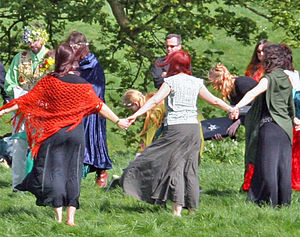
Image by Amarand Agasi via Flickr
Last Thursday, Fred Clark of Slacktivist fame wrote a fantastic review of Raised Right: How I Untangled My Faith from Politics, a book by Alisa Harris[1] that was released today. I was fascinated enough by Fred’s review and the quotes from the book he selected that I decided to purchase the Kindle edition of the book. I started reading it tonight and decided I’d start blogging about it.
What interests me most about the books is that in many ways, Harris and I come from very similar backgrounds. I was raised in a conservative evangelical community, was raised to believe that homosexuality was an abomination[2], abortion was murder, and good Christians voted Republican.
Where my upbringing differs from that of Harris is that while I was raised to believe all the same things, my family was not very politically active and did not consider it our duty to be so. Certainly, my parents voted — and always for candidates who promised to stand “on the right side” of various issues. They considered (and to the best of my knowledge, still do) both their civic duty as well as a part of their service to God. But they were not people to carry picket signs, write letters to elected officials, or even give to various political organization. In fact, if my parents gave to anything other than their church, I suspect it would be the Family Life Network, which runs a number of radio stations whose coverage includes the county my parents live in.
I think this is in part because my parents understood there is more to Christian life than the political machinations that Harris writes about. My parents are far more community-oriented and understand that Christian life is about building and serving community as much as — maybe even more than — it is about stopping “the gay agenda” or shouting down doctors who perform abortions or women who seek out their services. In some ways, I consider it an advantage to having grown up in a very rural area.
I think growing up in that rural area is another part of the reason for why activism didn’t play such a big part in my childhood, though. Where my parents live, all that “political stuff” happens somewhere else, places like New York, Washington D.C. and San Francisco. Sure, there were gay people and women who had abortions around, but it was — or at least appeared to be — something extremely rare. People in our community were “good people” whose exposure to such things was minimal and possibly even nonexistent. So picketing is something that would have involved long drives. And with Boy Scouts for me (until I quit when I was about 14) and twirling baton in parades for my sister who had time for all that traveling to exotic and dubious places?
On the flip side, I suppose this makes my family and me typical members of the religious conservatives’ “target audience.” I was someone who knew nothing about what gay people were like, who knew nothing of the issues of abortion, or anything else the religious activists beat their drums about. I had no way of evaluating what they told me for accuracy or honesty — or at least I had no idea how to go about doing so.
So I come to Harris’s book as something of a kindred spirit, yet as someone who’s experience is slightly different. We have come to similar places — though she retained her Christian faith while I moved on — but by slightly different routes. And that is what I would like to explore as I go through the book, hopefully chapter by chapter.
[1] To the best of my knowledge, the author and I are not related.



![Reblog this post [with Zemanta]](http://img.zemanta.com/reblog_e.png?x-id=5739e7ca-beb4-4e19-889e-69f08cfa0cf4)